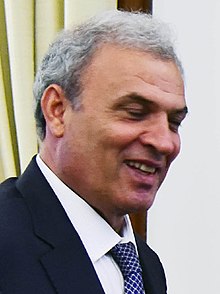Ziad Abu Amr (Arabic: زياد أبو عمرو; born 1950) is a Palestinian politician, author, and member of the Palestinian Legislative Council. He currently serves as the first deputy prime minister and is a member (independent) of the PLO Executive Committee. From 18 March 2007 to 17 June 2007, he was Foreign Minister of the Palestinian National Authority. On 6 June 2013, Ziad Abu-Amr was appointed as Deputy Prime Minister of the Palestinian Authority by President Mahmoud Abbas.[1]
Ziad Abu Amr | |
|---|---|
| زياد أبو عمرو | |
 | |
| Deputy Prime Minister of the State of Palestine | |
| Assumed office 6 June 2013 Serving with Nabil Abu Rudeineh (since 2019) | |
| President | Mahmoud Abbas |
| Prime Minister | Mohammad Shtayyeh |
| Minister of Foreign Affairs of the State of Palestine | |
| In office 18 March 2007 – 17 June 2007 | |
| Preceded by | Mahmoud al-Zahar |
| Succeeded by | Salam Fayyad |
| Member of the PLO Executive Committee | |
| Assumed office May 2018 | |
| Member of the Palestinian Legislative Council for Gaza City | |
| Assumed office 20 January 1996 | |
| Personal details | |
| Born | 22 January 1950 Gaza City, Gaza Strip |
| Nationality | Palestinian |
| Political party | Independent |
| Alma mater | Damascus University Georgetown University |
Background edit
Born in Gaza City on 22 June 1950, Abu Amr attended Damascus University in Syria, where he earned a bachelor's degree in English literature and language in 1973.[2][3] He studied at Georgetown University in Washington, D.C., receiving an MA in Arab Studies from the Center for Contemporary Arab Studies in 1979 and a PhD in Philosophy and Comparative Politics in 1985.[3][4] After working as a teacher in Bahrain, Oman, and Syria in the 1970s, he taught political science at Birzeit University in Ramallah from 1985 to 1993.[3]
Political career edit
Running as an independent candidate in the 1996 Palestinian general election, he won a seat in the Palestinian Legislative Council (PLC) representing Gaza City. During this period, he was chairman of the PLC's political committee.
He was re-elected in legislative elections that took place on 25 January 2006, winning 55,748 votes.[5]
From April to October 2003, he was Minister of Culture in the government of Prime Minister (now President) Mahmoud Abbas.[7][8]
After a period of factional violence in the Palestinian territories in early 2007, the Hamas-led government resigned on 15 February. Prime Minister Ismail Haniyeh formed a new national unity government with Abu Amr as foreign minister.[9] The cabinet was approved by the PLC and its members took office on 18 March.
On 6 June 2013, Ziad Abu-Amr was appointed as Deputy Prime Minister of the Palestinian Authority by President Mahmoud Abbas.[1]
He is associated with many political associations, including the Palestine Center in Washington D.C., the Palestinian Council on Foreign Relations, the Palestinian Academic Society for the Study of International Affairs (PASSIA), and MIFTAH, a Palestinian civil rights organization.[4]
Political ideology and views edit
Abu Amr is considered a reform-minded politician and part of the "young guard" of Palestinian leaders. He has, at times, been critical of the Palestinian Authority administration and security services.[2][4] He has mediated talks between the two main Palestinian factions, Hamas and Fatah, and is widely respected by both groups.[2][8]
A proponent of democracy and democratic elections, he has been a supporter of representation for opposition groups such as Hamas and Islamic Jihad, claiming that they would be held more accountable for their actions.[2]
Miscellaneous edit
Abu Amr is married and the father of five children. Currently, he lives in Ramallah, West Bank. He has published several books, the most well-known being Islamic Fundamentalism in the West Bank and Gaza: Muslim Brotherhood and Islamic Jihad.[10]
See also edit
References edit
- ^ a b "West Bank: Palestinian Authority Swears in its New Prime Minister". The New York Times. 6 June 2013.
- ^ a b c d Ziad Abu Amr – Jewish Virtual Library
- ^ a b c "PASSIA – ABU AMR, ZIAD MAHMOUD (-)". passia.org. Retrieved 2 December 2023.
- ^ a b c Ziad Abu Amr Archived 1 July 2007 at the Wayback Machine – Le Manifeste: Mouvement pour une Paix Juste et durable au Proche-Orient
- ^ Final results for the electoral districts Archived 10 September 2008 at the Wayback Machine – Central Elections Commission-Palestine
- ^ 20 September 2017. Facebook: The Trump White House Archived. President Donald J. Trump and President Mahmoud Abbas of the Palestinian Authority at the United Nations General Assembly (Official White House Photo by Shealah Craighead)
- ^ The PA Ministerial Cabinet List Archived 15 December 2003 at the Wayback Machine, April 2003. – Jerusalem Media & Communication Centre
- ^ a b Profiles: Palestinian unity government – BBC News, 20 March 2007.
- ^ The PA Ministerial Cabinet List Archived 4 October 2009 at the Wayback Machine, March 2007. – Jerusalem Media & Communication Centre
- ^ "Islamic Fundamentalism in the West Bank and Gaza". Indiana University Press. Retrieved 2 December 2023.
External links edit
- Palestine Center Archived 16 April 2012 at the Wayback Machine
- Palestinian Council on Foreign Relations
- MIFTAH